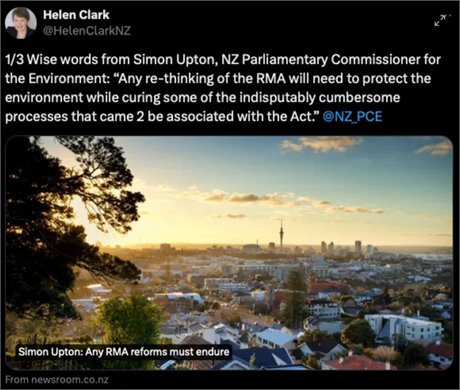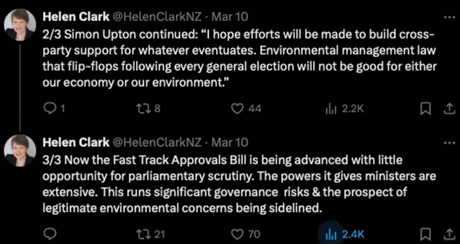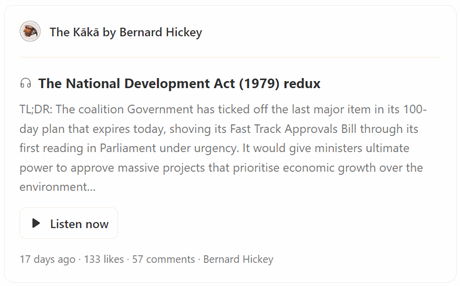The new Government finished its first 100 days with a record run of repeals, surprises and fast-moves that range from disappointing to ‘dangerous’. Let me explain what ‘dangerous’ means, in terms of holding our nation back and turning us against one another.
The key word ‘dangerous’ stood out of my quote like a tall poppy as it closed off Rebekah White’s exploration of the Resource Management Act (RMA) Fast-Track legislation in New Zealand Geographic. Yet, my message expands on my comments in Paving over Paradise: even Chris Bishop and Shane Jones will probably do better to find common ground to moderate the Fast-Track legislation.
Many submitters and the big NGOs like Forest & Bird as well as the Environmental Defense Society (EDS) will come out hard against it. And they should. Yet if they do so without the Parliamentary Select Committee submissions process as a chance to design and argue for stable RMA reform, then they’re falling for a well-set trap that becomes a lose-lose proposition – the opposite of a win-win. In fact, it looks like a loss three times over.
Loss #1
The Government has the numbers to pass the Fast-Tracking Bill. Massive numbers of submissions opposing the Bill will only be of value if they bolster a case to moderate it and make it more durable.
Helen Clark has promoted Simon Upton’s vision of an RMA that did not need new legislation but could have been made to work better. That’s significant because they fought from opposite sides of politics for over a decade. Upton’s Newsroom Opinion article is well worth a careful read.


Read the Parliamentary Commissioner for the Environment’s (Hon Simon Upton) Op-Ed on Newsroom. It was published in January; the fast-track debate makes it truer and more urgent today.
Some progress and partial progress on needed frameworks is worth digging into further, including more uniform limits and targets as an alternative to bespoke processes to consider every attribute, plan change or consent. These could become a consistent, useable and community accessible way to acknowledge environmental limits that have become the norms of legislation in other nations and globally, on issues from acid rain to climate change. Limits, once established, can speed and ease decisions, offering sanity, transparency and a process that is not dangerous to our constitutional framework and norms of good governance.
A better process seems worth designing and fighting for.
“It’s got to be asked what the national catastrophe is that justifies empowering ministers to this extent in today’s environment.” –Constitutional Law Expert Prof Andrew Geddis
Loss #2
You might ask why Labour’s replacement bills for the RMA weren’t simpler and better? In most countries, NGOs and think tanks focus more on designing legislation from both partisan and non-partisan motivations. We’re different because our NGOs like Forest & Bird and EDS, as well as the upstart Environmental Legal Initiative know their real successes com from court challenges, including conservation orders. One good example was the death knell of Ruataniwha Dam and Irrigation Scheme. That scheme could be resurrected by fast-tracking, returned environmental protection to the paradigm of the past when “every victory was temporary and every loss was permanent.”
Fast-tracking makes subsequent court challenges disappear. It may even make standing before the expert panel or Ministerial decisions difficult to achieve.
The NGOs and the environment they protect would lose their pathway to success.
Loss #3
The biggest loss could be the enduring polarisation of our society, with what could be wild swings of legislation and regulation between elections. We should be wary that enabling this polarisation – a desperate fight or flight instinct on both sides of politics during as economic trouble also escalates.
The possibility that environmental NGOs once again become pitted against a Muldoonian development programme is dire. But perhaps it understates the problem.

Muldoon’s ‘Think Big’ policies and 1979 National Development Act were pro-development in a way that unquestionably lacked balance, but they were also contained within the state or in state-owned enterprises, effectively socialising any gains. Hear me out when I say that the current direction is more worrying – it resembles the 1970s actions of Pinochet in Chile or the other Junta regimes that decimated the economies of Argentina, Brazil and Uruguay with mixtures of cuts and ‘free market reforms.’
The driving philosophy of the policies imposed across South America became known as neo-liberalism. This may sound familiar enough, particularly if you read Chapter 3 of Naomi Klein’s Shock Doctrine, or already use this term to describe the legacy of the 1990s in New Zealand. Klein’s book, published back in 2007, feels slightly dated when we consider how much the Shock Doctrine approach evolved. Even by 2007 it became somewhat friendlier and hid its ‘shock and awe’ better than the football stadium massacres that caused Pinochet’s Chile to suffer crippling international ire and boycotts.
But how have they evolved? I reminded myself and quickly realised I couldn’t find a single gap between the policy goals Klein warns of us in the Shock Doctrine, and the known policy goals of the Atlas Network that has multiple shadowy links into the coalition government. These links were most notably traced through the surprise repeal of anti-smoking smoking legislation, which is worrying due to the links between tactics of the smoking lobbyists and strategies such as climate change denial.
These steps take us way beyond Klein’s narratives about the rapid privatisation of public schools and housing in New Orleans in the recovery from Hurricane Katrina.
Evidence of a kinder, more democratic Shock Doctrine is all around us
That’s no smoking gun, but the evidence of a kinder, friendlier and more democratic Shock Doctrine is all around us in Aotearoa New Zealand.
And with large cuts to our research institutions, and ongoing financial crises in our universities which serve as ‘critic and conscience’ of society, you might wonder who will still be willing to pop their head up above the parapet to express concern. The obvious answer would be the media, except for the cuts to our major TV newsrooms and ‘papers’. In fact, most of the 100 Day agenda was carried out while the in-depth current affairs shows like Q&A, which less than 52 weeks of funding, were on summer break from November through February.
From Katrina to Gabrielle: collective forgetfulness?
We may have recovered from the pandemic, but not the onward shocks to supply chains, inflation and recessions it has induced. To listen to the talk of Labour running up big deficits, we could forget both the pandemic and massive scale of damage from Cyclone Gabrielle, which hit only a little over a year ago. I’m unsure what to make of the forgetfulness.
We might consider that with our massive infrastructure deficit and climate change on the way, we’re vulnerable. When we have systems as confusing as the notion that new consents and plans should account for very unlikely sea level rise scenarios, we appear to be developing systems across our society which may benefit rich and powerful.
The list of those likely to benefit include, foreign investment, their foreign lobbyists and the consulting firms that design and advise our government on adjusting the rules. These patterns are hallmarks of small government approaches, and according to Mariana Mazzucato’s latest book explain many of the problems we face. It is the opposite of the just and equitable transitions we need, at a time when so much is possible to address challenges in our housing, infrastructure and environment along with reducing our emissions and adapting to climate change.
We just don’t have to go to extremes. In fact, there’s every reason to believe that it helps National and probably their coalition partners steer toward the middle ground. In that middle ground, we can all follow Helen Clark and Simon Upton’s advice – and build stable systems that make a better New Zealand.
Ultimately, the Shock Doctrine approach is easier to see for what it is and fight, than it is to ponder what drives it. We need to resist the urge to fight first or flee – instead finding ways to innovate together. An important first step is testing the the opportunity to make the fast-track legislation sensible and transparent as well as a path to better and more durable resource management legislation.
____________________________________________________________
Troy Baisden is Co-President – New Zealand Association of Scientists, member of MBIE’s Te Ara Paerangi Future Pathways Reference Group, and Principal Investigator – Te Pūnaha Matatini Centre of Research Excellence.
Originally published on the Environmental Integrity Project.
- SEO Powered Content & PR Distribution. Get Amplified Today.
- PlatoData.Network Vertical Generative Ai. Empower Yourself. Access Here.
- PlatoAiStream. Web3 Intelligence. Knowledge Amplified. Access Here.
- PlatoESG. Carbon, CleanTech, Energy, Environment, Solar, Waste Management. Access Here.
- PlatoHealth. Biotech and Clinical Trials Intelligence. Access Here.
- Source: https://www.carbonnews.co.nz/story.asp?storyID=31108



